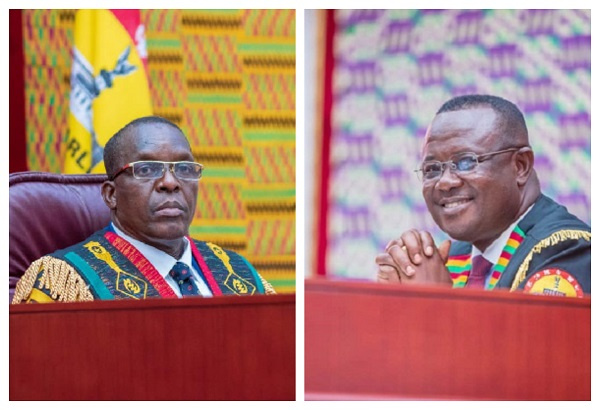The Supreme Court has lashed out at critics who questioned why a Deputy Speaker could vote and be counted as part of the quorum in Parliament.
In a 29-page document, the apex court noted that Article 97 (1) of the 1992 constitution states that a Speaker of Parliament cannot be an MP, but Deputy Speakers were elected as legislators.
The court held that by virtue of being MPs, deputy speakers still have the right to vote when deciding on a critical issue. To prevent them from voting would amount to disenfranchising their constituents in Parliament.
“To cause a member to forfeit their vote in Parliament merely on account of having to preside over the business of the House in the Speaker’s absence would unfairly disenfranchise not only the presiding member but also their constituents. Such an interpretation would likely give rise to certain perverse outcomes.
“For example, it could lead to opportunistic absences by a Speaker or one of the other Deputy Speakers, as an absence would mean a vote loss by the presiding member and their party,” the court held.
According to the seven-member panel who presided over the case, the constitution clearly defines a person elected as a Speaker and a Deputy Speaker and what their functions are.
It pointed out that Article 104 (2) specifically mentioned that “The Speaker” be prevented from casting a vote and not other persons, such as deputy speakers presiding over proceedings of Parliament.
“Significantly, the voting disqualification in Article 104(2) is specific to the Speaker, and therefore does not generally apply to the person presiding.
“The Speaker is disqualified from voting not because he or she presides over sittings of Parliament, but because the Speaker is not a Member of Parliament, voting being a right only for Members of Parliament,” the court held.
It was also the considered view of the court that the only instance whereby a Deputy Speaker or any MP was barred from voting on the floor of Parliament was under Article 104(5), which is when the MP had a conflict of interest in a specific contract under consideration.
“Presiding at a sitting of Parliament is not intended by the framers of our Constitution to be a disqualifying conflict of interest, and therefore, a presiding Deputy Speaker does not forfeit his or her right to vote merely by virtue of presiding in the absence of the Speaker,” the court added.
Background
A private legal practitioner, Justice Abdullai, sought to challenge the constitutionality of the First Deputy Speaker, Joseph Osei-Owusu, in counting himself as an MP when he presided over the passage of the 2022 budget on 30 November 2021.
The suit was filed at a time when there seemed to be growing incoherence in the decisions of Speaker Alban Bagbin and his First Deputy, Joseph Osei-Owusu.
Justice Abdullai believes that the 1992 Constitution does not allow a person presiding over proceedings in Parliament to have a casting vote or to be part of a quorum. A casting vote is an extra vote given by a chairperson to decide an issue when the votes on each side are equal.
His argument is based on Article 102 of the 1992 Constitution, which provides that “a quorum of Parliament, apart from the person presiding, shall be one-third of all Members of Parliament.
Article 104 (1) also provides that matters in Parliament shall be determined by votes of majority members present and voting, with at least half of all members of Parliament present.
He also cites Article 104 (2) of the 1992 Constitution, which stipulates that: “The Speaker shall have neither original nor casting vote.”
It is the case of Mr Abdulai that the First or Second Deputy Speakers of Parliament, when presiding, have the “same authority and mandate just like the Right Honourable Speaker” and therefore cannot vote or be part of the quorum.
But the Attorney-General disagreed.
Godfred Yeboah Dame argued that the quorum in Parliament formed under Article 102 is different from the quorum formed under Article 104 of the 1992 Constitution.
It is the case of Mr Dame that the quorum under Article 102 is for the conduct of business in Parliament, and that is why Article 102 provides that it should be one-third of members.
“Given that Parliament presently is made up of 275 members, the quorum under Article 102 for the conduct of its business is 92 MPs,” the A-G submitted.
According to the A-G, based on the clear provision of Article 102, any person presiding, either the Speaker or Deputy Speakers, is precluded from being part of that quorum.
On the other hand, the A-G is of the view that the quorum under Article 104 (1), which deals with the determination of matters through voting in Parliament, requires at least half of all MPs, and such a quorum is not the same as the one in Article 102.
Mr Dame contends that unlike Article 102, which precludes a “person presiding” from being part of the quorum, Article 104 (2) specifically precludes “The Speaker”.
The A-G, therefore, holds the position that only the person elected as “The Speaker” of Parliament is barred from forming part of the quorum under Article 104 when presiding, and not the Deputy Speakers who preside over proceedings.
Below is the full judgement :



